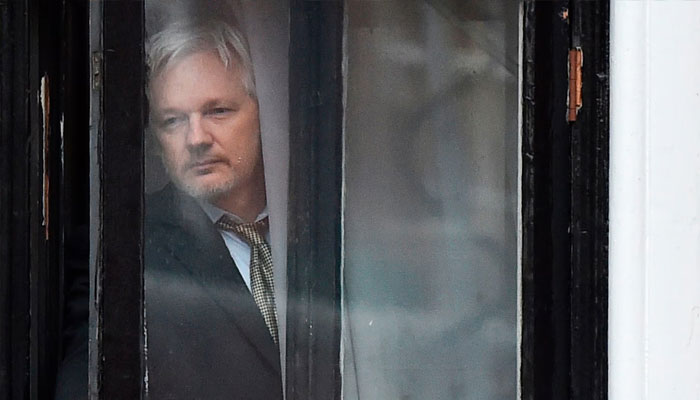Assange wins bid to appeal US extradition ruling: UK judges
LONDON: WikiLeaks founder Julian Assange on Monday won a bid to appeal against a UK court ruling that approved his extradition to the United States to face trial for breaking national security laws.
Two London High Court judges granted Assange permission to appeal, having previously asked Washington to provide “satisfactory assurances” about free speech protections at any US trial. Those submissions were presented at a hearing on Monday, which the 52-year-old Australian did not attend.
Assange is wanted by Washington for publishing hundreds of thousands of secret US documents from 2010 as head of the whistle-blowing website WikiLeaks. Had he lost at Monday´s hearing, Assange -- who has become a figurehead for free speech campaigners -- could have been swiftly extradited after a five-year legal battle.
Instead, he will now face another court battle in his long-running legal saga, after the UK government approved his extradition in June 2022. Assange´s wife Stella said outside court that the ruling “marks a turning point” and that “we are relieved as a family that the court took the right decision.
“Everyone can see what should be done here. Julian must be freed,” she added. Human rights monitor Amnesty International called the ruling “a rare piece of positive news for Julian Assange and all defenders of press freedom”.
“The USA´s ongoing attempt to prosecute Assange puts media freedom at risk worldwide. It ridicules the USA´s obligations under international law, and their stated commitment to freedom of expression,” said Simon Crowther, legal adviser at Amnesty.
In written submissions for the hearing, Edward Fitzgerald, representing Assange, accepted as “unambiguous” US government assurances that he would not face the death penalty. But he queried whether his client could rely on the First Amendment of the US Constitution, which covers freedom of speech and freedom of the press, at trial.
James Lewis, representing the US government, told the court Assange´s conduct was “simply unprotected” by the First Amendment. It does not apply to anyone “in relation to publication of illegally obtained national defence information giving the names of innocent sources to their grave and imminent risk of harm”, he submitted.
-
 Savannah Guthrie Sends Desperate Plea To Mom Nancy Kidnapper
Savannah Guthrie Sends Desperate Plea To Mom Nancy Kidnapper -
 NBA All-Star 2026 Shake-up: Inside The New USA Vs World Tournament Format
NBA All-Star 2026 Shake-up: Inside The New USA Vs World Tournament Format -
 Warner Bros Consider Reopening Deal Talks With Paramount, Says Reports
Warner Bros Consider Reopening Deal Talks With Paramount, Says Reports -
 Andrew Mountbatten Windsor Faces Future With UK MPs, Says Expert
Andrew Mountbatten Windsor Faces Future With UK MPs, Says Expert -
 Shamed Andrew Told 'nobody Is Above The Law' Amid Harrowing Silence
Shamed Andrew Told 'nobody Is Above The Law' Amid Harrowing Silence -
 Gisele Bundchen Melts Hearts With Sweet Bike Ride Glimpse Featuring Son
Gisele Bundchen Melts Hearts With Sweet Bike Ride Glimpse Featuring Son -
 Prince William Found Meghan Markle ‘quite Refreshing’ At Start
Prince William Found Meghan Markle ‘quite Refreshing’ At Start -
 Kate Middleton Knew Should Could Not Be ‘voice Of Reason’ With Prince Harry
Kate Middleton Knew Should Could Not Be ‘voice Of Reason’ With Prince Harry -
 Rihanna Has Wardrobe Malfunction At A$AP Rocky Fashion Show
Rihanna Has Wardrobe Malfunction At A$AP Rocky Fashion Show -
 Prince Harry Felt System Had ‘one Rule For Him, One For Prince William’
Prince Harry Felt System Had ‘one Rule For Him, One For Prince William’ -
 Jake Paul's Fiancée Sends Him Over The Moon Over Stunning Victory
Jake Paul's Fiancée Sends Him Over The Moon Over Stunning Victory -
 Harper Beckham Sends Valentine’s Love Amid Brooklyn Family Drama
Harper Beckham Sends Valentine’s Love Amid Brooklyn Family Drama -
 Why Prince William, Kate Middleton 'partnership' Is Important For Monarchy
Why Prince William, Kate Middleton 'partnership' Is Important For Monarchy -
 Katie Price Drama Escalates As Family Stays In Touch With Ex JJ Slater
Katie Price Drama Escalates As Family Stays In Touch With Ex JJ Slater -
 Critics Target Palace Narrative After Andrew's Controversy Refuses To Die
Critics Target Palace Narrative After Andrew's Controversy Refuses To Die -
 Sarah Ferguson’s Delusions Take A Turn For The Worse: ‘She’s Been Deserted’
Sarah Ferguson’s Delusions Take A Turn For The Worse: ‘She’s Been Deserted’




